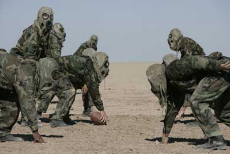
It's not clear whether director Sam Mendes intended, with his new movie Jarhead, to fashion a tragic-comic remake of Full Metal Jacket. Whatever the intentions, though, the road to hell, or at least purgatory, may well involve a viewing of this unfortunate film.
Stanley Kubrick's 1987 classic has come to represent the ultimate cinematic expression of the sentiment that boot-camp-is-hell-and-war-is-worse. Jarhead shares the form - boot camp followed by war - but little of the substantive content. Instead, a film with an impressive cast, starring the promising (at least on paper) duo of Jamie Foxx and Jake Gyllenhaal, can only deliver a pale imitation: Boot camp is somewhat traumatic, potentially deadly, but generally a festival of male-bonding and misogyny, while war is hell because you might not even get to kill anyone.
Timing was right
Perhaps Jarhead's timing generated too high of expectations. Released as George W. Bush's approval ratings reached all-time lows and a simmering Iraq war-related scandal picked off Dick Cheney's top advisor, the film is jarringly off-point to anyone thinking about the implications of a war fought for oil and empire. Based on an account of the same title written by Anthony Swofford tracing his years in the Marines, the film relegates to a few irrelevant lines the serious critique of U.S. motivations in the Middle East that are reportedly included in the book.
At the forefront, instead, is the hyper male chauvinism of the Marine Corps. Before elaborating on this, a brief sketch of the film's "plot" is in order. Jarhead never really does get going; instead, after introducing us to our main characters in boot camp, the film heads to the Saudi desert. There, the marines train, sweat, hydrate and wait; frustration mounting with every week that goes by without seeing any action. Finally, in early 1991, the war begins and yet even then the ground forces barely get any 'action'. The marines wander through the desert and past a smattering of largely uncontextualized images of the war. The tragedy of war is alluded to - as, for instance, when the soldiers stumble upon the charred remains of Iraqis slaughtered on the 'highway of death' - but, by and large, the marines are portrayed as the victims because they don't get to kill a "raghead" themselves. The absurd victory celebration scene includes the worst ever use of Public Enemy's "Fight the Power".
No women admitted
As glaring as the lack of an engaging plot is, the lack of women in the film: A grand total of three females make appearances. First, there is Swofford's girlfriend, whom our protagonist dutifully misses while he suspects, and later has confirmed, that she is cheating on him with some sweater-wearing co-worker, who - as she writes to our hero -- "is a good listener". Later, the troops, ever bored defending the Saudi oil fields and waiting for the war to begin, assemble to watch The Deer Hunter, the second renowned Vietnam war film to be egregiously included in this movie (the other being Apocalypse Now, which the marines watch while un-ironically hooting and hollering at the scene of the bombing of a civilian village). A few seconds into the tape of Deer Hunter, however, the tape cuts to a couple having sex, at which point one of the troops - an insignificant character - gets up and starts screaming "that's my wife, that's my wife with my neighbour!" One truly wonders why this scene needed to be included, given the aggrieved character's irrelevance to the story, other than to reinforce the notion of women as scheming and duplicitous.
Finally, there is one Arab woman in the film. She's riding in the back of a Mercedes that passes by the marines' truck, at which point, one of the U.S. boys makes a series of lewd gestures.
Systematically sexist
All of this may well be an accurate depiction of life in the marines. It should lead, at the very least, to some reflection on the absurd premise that U.S. endeavours in the Middle East have anything to do with liberating women, given that the instrument of supposed liberation is one of the most systemically sexist organizations imaginable. Even the veteran commander played by Chris Cooper - he of the subtle and brilliant lampooning of George Bush in Silver City -- can only express excitement in a speech to rally the troops by yelling "I'm getting a hard on!"
Jarhead, it should at least be said, is not quite a recruitment video. The marines apparently refused any official cooperation because they objected to the film's depictions of aspects of life in the corps. But, especially given that the most recent U.S. war in Iraq is perhaps the central political issue in the world today; it's difficult to get excited about a film that makes such a shallow exploration of war. Unfortunately it seems that, as it was for the Vietnam Era, many of the best anti-war films may not be made until long after the worst devastation is done, and/or the invading armies are finally forced to pullout.
Derrick O'Keefe is a founding editor of Seven Oaks, an online political magazine. Dorothy Woodend will be back next Friday reviewing films for The Tyee. ![]()














Tyee Commenting Guidelines
Comments that violate guidelines risk being deleted, and violations may result in a temporary or permanent user ban. Maintain the spirit of good conversation to stay in the discussion.
*Please note The Tyee is not a forum for spreading misinformation about COVID-19, denying its existence or minimizing its risk to public health.
Do:
Do not: